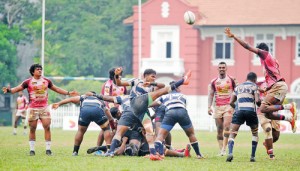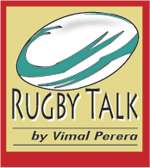Serious contenders head and shoulders above ‘also ran’
View(s):
The fortunates -- Havelocks -- and the unfortunates -- Police -- proved that the Dialog Rugby League first round did not go on as expected - File pic by Amila Gamage
Round 1 of the Dialog Rugby League is over and on the tip of the tail-end of 2016 hangs a board asking “What will it be like in 2017”? Nothing much, except that, the Cup still dangles waving to Havelocks Navy and Kandy. Rugby will see more erratic passes, less flow and more grumbling. The grunting will increase with the schools season. This will be because the expenditure to make professional players out of scruffy schoolboys extend in geometric progressions, compared with the values sports is expected to cultivate in schoolchildren.
Beginning with the last week of December, there is expected to be another 7 weeks with the Police and CH still clinging to the tail. Police have won one match and that too, against CH who has not won any so far.
What good does it do for competitive Rugby by continuing to accommodate these two teams which neither have a chance whatsoever in looking at the crown nor have shown a capability of being a lively participant? What then is the aim of keeping them, which otherwise would have seen a tournament over in 5 weeks, giving more time for the National team.
On the other hand, Havelocks are on top because of a better “for” points and Navy lie 2nd. Both teams have one loss on record. Kandy is third, having lost two games but, have a better “for” points than 1st or 2nd in the Table. It is a long tail for CR and Air Force who have lost 3 matches, while Army hangs on having lost 5 matches in Round 1, have at least a chance of laying their hands on the Cup. The 3 teams however, can be the restless elephant in the pageant that can upset the torchbearers in front.
The contender close to the two teams, Kandy, can get a maximum of 7 wins, making a tally of 12. On the other hand, if the Park Club and Navy win 5 out of 7 games, both will have 12 wins. This will be uppermost in the minds of Ronnie Ibrahim and Mothilal Jayatilleke, who have been able to keep the talent together in Round 1. It shows that the locals who understand the locals have done well so far. It is an indication they understand the players better and hold a team that has set skills (not the best), in their bid to win the Cup. The foreign coaches who are accustomed to a different playing culture, need the correct putty in their hands. That is what is needed for the long term development. A close tournament with a few points separating a game does not mean there is exciting Rugby played using greater skills. The only excitement I see, results from close scores and the spirits that take over.
 The National team needs more for meeting the teams of Asia than what we see dished out in games. Ball handling is a problem. So is the tackling which is weak and prone to being penalised as players don’t get their arms around. The breakdown is another issue, with a tendency to charge onto opponents with no attempt to bind. Scrums seem steady but binding seems to be an issue. The release at the tackle seems better but, other areas have a lot to be done. This can happen only if the player is nurtured from the time he plays school Rugby. This needs a plan that reaches the top from the bottom.
The National team needs more for meeting the teams of Asia than what we see dished out in games. Ball handling is a problem. So is the tackling which is weak and prone to being penalised as players don’t get their arms around. The breakdown is another issue, with a tendency to charge onto opponents with no attempt to bind. Scrums seem steady but binding seems to be an issue. The release at the tackle seems better but, other areas have a lot to be done. This can happen only if the player is nurtured from the time he plays school Rugby. This needs a plan that reaches the top from the bottom.
A good prospect for the future is the work done to have a memorandum between the schools section and the SLRU. This is something that has been lacking and has been a gross contributor to the negative aspects of the game at National level. Skills have at times been second to the need to win. The need to work together is more important and the work done by the Union headed by President Asanga Seneviratne is laudable. The results, however, will not be seen in a matter of seconds but, will be a long term prospect. With the proposed partnership, I believe, a better relationship will be forged and Rugby will be served better. Hopefully, the era of the uncouth, which has been a dividing factor, is over, as we hear that the gentleman, Priyantha Ekanayake, will look at development.
Rugby in Sri Lanka needs competent planners and developers than the saliva splitting, unkempt who are at all levels of Rugby. It is also understood that the Ministry of Education is framing a code on player transfer (not limited to Rugby) which may have the good and the bad. The good is that, the less affluent may retain and develop teams, and the bad is that, a talented player may remain unseen and unsung. This, I am told, will not affect those who have already crossed over. It will have a bearing on those who intend to change after the “OL” results. It is also understood that the proposed changes will exclude those who are not paid by the State in holding office in the committee of any sport. Fondly, this is called the “Darling Factor”.
Vimal Perera is a former Rugby Referee, coach and Accredited Referees Evaluator IRB


